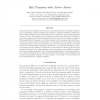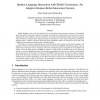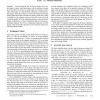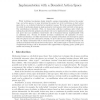173 search results - page 10 / 35 » Comparing Agent Modeling For Language and Action |
ICLP
2010
Springer
15 years 6 months ago
2010
Springer
hex programs were originally introduced as a general framework for extending declarative logic programming, under the stable model semantics, with the possibility of bidirectional...
124
Voted
CONNECTION
2008
15 years 2 months ago
2008
Spoken language is one of the most intuitive forms of interaction between humans and agents. Unfortunately, agents that interact with people using natural language often experienc...
146
click to vote
AIL
2008
15 years 2 months ago
2008
Software agents' ability to interact within different open systems, designed by different groups, presupposes an agreement on an unambiguous definition of a set of concepts, ...
117
click to vote
ECAI
2004
Springer
15 years 8 months ago
2004
Springer
Action formalisms like the fluent calculus have been developed to endow logic-based agents with the abilities to reason about the effects of actions, to execute high-level strateg...
104
Voted
SIGECOM
2006
ACM
15 years 8 months ago
2006
ACM
While traditional mechanism design typically assumes isomorphism between the agents’ type- and action spaces, in many situations the agents face strict restrictions on their act...




